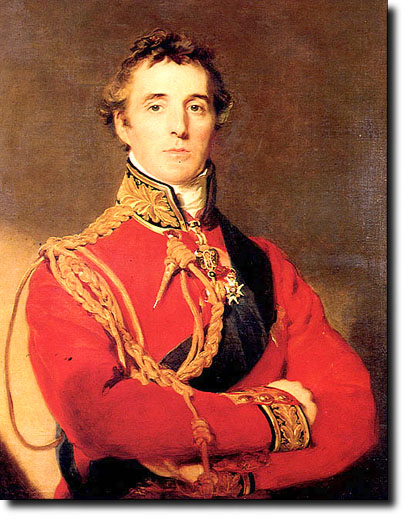|
|

 |
|
As a politician, Wellington enjoyed limited success. He was an extremely rigid Tory and opposed most reforms that were placed in front of him. His one liberal act was to support Catholic Emancipation in 1829 but even this was after a considerable tussle.
The fourth son of an Irish peer, he was educated at Eton and the French Military College at Angers. He entered the army at 16 with a bought commission and became Lieutenant of the 33rd Regiment at the age of just 24. He earned his early battle experience in India against Tippu Sultan and the Marathas. With fresh combat experience, he was appointed as commander of the British forces in the Iberian peninsula where he regularly put up a strong fight against French generals who were used to winning. The military culmination of his career came with the 'damn, close-run thing' victory at Waterloo in 1815. The national hero was feted back home. However, he did not use his newly one influence to reform and modernise the army. Indeed, he seemed to block all reforms no matter how minor or how badly needed by the army. He believed that English Public Schools were best at producing commanders who would lead their soldiers out of duty rather than for material reward. He believed in harsh discipline and that soldiers only joined the army from some 'vicious motives'. He regularly employed the lash and sought to have this displinary tool remain a staple of the British Army. He became Prime Minister in 1828 after the death of Canning and the resignation of Goderich. The prestige of the Duke ensured wide spread support at first although his conservatism and rigidity surpised even his Tory backers. Although these were also to be disappointed by his backing for the Catholic Emancipation bill. In fact, he even fought a duel over the matter with Winchilsea in 1829. The Duke steadfastly refused to countenance reform of parliament which lost him considerable support in the country at large. He became so unpopular with those aspiring to join the political classes that his house was showered with stones and bricks. He resigned in 1830 with the fear of mob rule ringing in his ears. In his old age, he became Commander in Chief of the Army again. And in 1848 he organised a military force to protect London against possible Chartist violence at the large meeting at Kennington Common. The revolutions across Europe made this a particularly acute time for the old warhorse. His death in 1852 as Commander in Chief of the Army meant that it would be in a poor state on entering war with the Russians just a few years later in the Crimean War. |
 |
 |
 |

|

|

|
Armed Forces | Art and Culture | Articles | Biographies | Colonies | Discussion | Glossary | Home | Library | Links | Map Room | Sources and Media | Science and Technology | Search | Student Zone | Timelines | TV & Film | Wargames